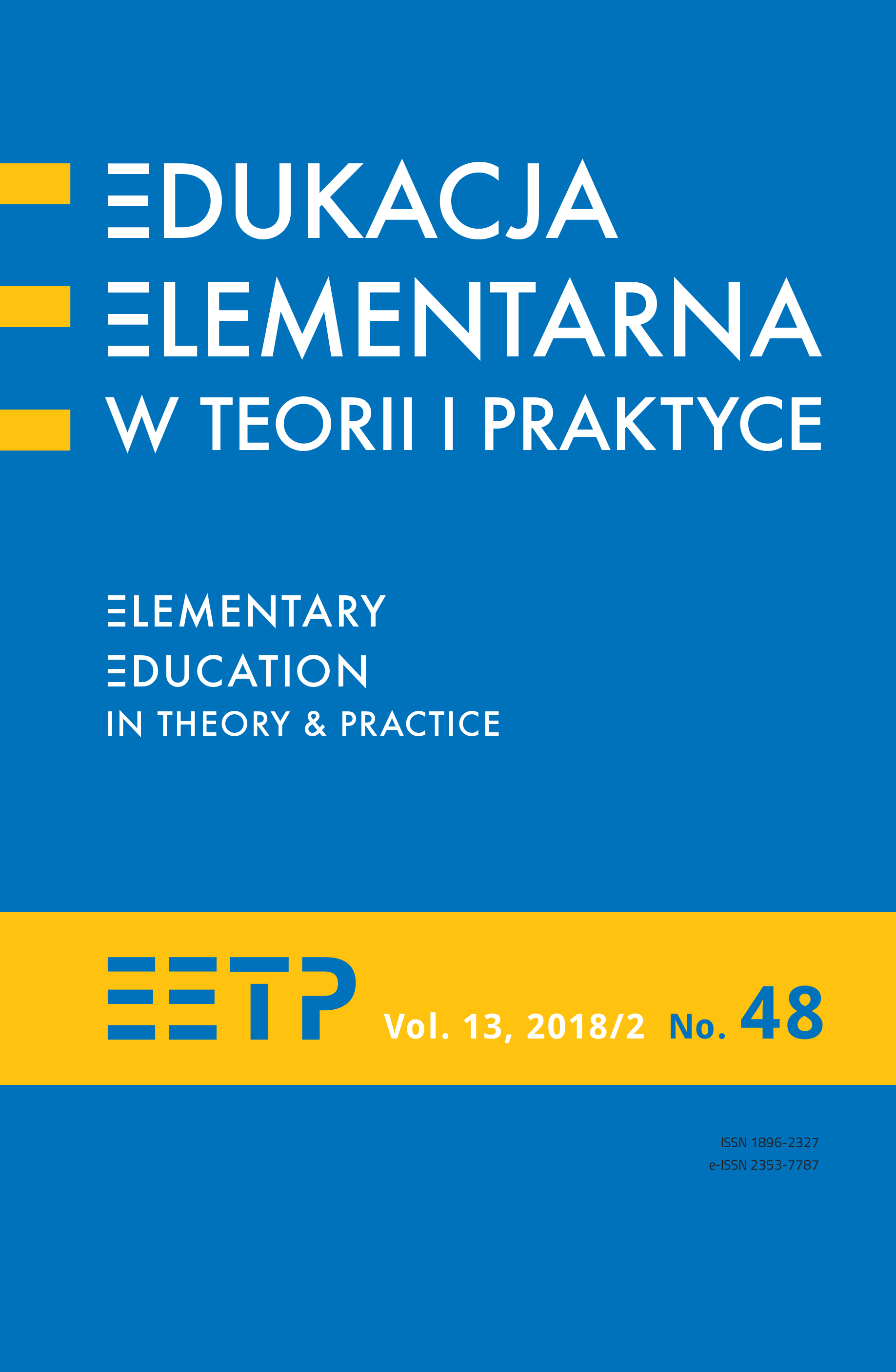Bariery w pracy nauczycieli oraz innowatorów edukacyjnych na podstawie wyników badań pedagogicznych
Abstrakt
Proponowany artykuł ma charakter badawczy. Przybliżono w nim wyniki badań przeprowadzonych wśród zespołów nauczycielskich (rad pedagogicznych) oraz innowatorów edukacyjnych. Ich podstawowym celem było zebranie opinii na temat codziennej pracy nauczycieli, a przede wszystkim doświadczanych przez nich trudności i barier, rozpoznawanych zasobów psychospołecznych, potrzeb oraz obaw związanych z wykonywaną pracą. Na 42 radach pedagogicznych zastosowano swobodne wywiady grupowe oraz narzędzia coachingowe w celu moderowania dyskusji prowadzonych w dużych zespołach nauczycielskich. Innym typem badań były swobodne wywiady z innowatorami rozpoznawalnymi w polskim środowisku edukacyjnym. Poproszono ich o opowiedzenie o swojej drodze zawodowej, a istotnymi wątkami narracji były te związane ze środowiskiem pracy (trudności, obawy, zasoby psychospołeczne). W części badawczej artykułu przytoczono wyniki badań, które dotyczą doświadczanych przez nauczycieli barier i trudności w pracy. Postawiono hipotezę, że przywoływane przez nauczycieli trudności de facto utrudniają wprowadzanie i realizowanie działań twórczych i innowacyjnych nie tylko na poziomie klasy, ale i całego systemu szkolnego. W artykule dokonano klasyfikacji barier doświadczanych przez rozmówców, szukano też punktów wspólnych oraz różnic.
Bibliografia
Adair J. (with Peter Reed), Od bossa do lidera. Prowadzić innych do sukcesu, Oficyna Wolters Kluwer Business, Kraków 2008.
Adams J., Conceptual Block Busting: A Guide to Better Ideas, Perseus Book, New York 1986.
Amabile T.A., Creativity in Context. Update to the Social Psychology of Creativity, Westview Press, Boulder 1996.
Charmaz K., Teoria ugruntowana. Praktyczny przewodnik po analizie jakościowej, Wydawnictwo Naukowe PWN, Warszawa 2009.
Chmielińska A., Modrzejewska-Świgulska M., Diagnoza stanu, czyli nauczyciele o sobie i swojej pracy. Krótki raport z badań, [w:] System wspierania rozwoju szkół w powiecie kartuskim (materiały projektowe), Centrum Inicjatyw Edukacyjnych, Kartuzy 2015.
Chmielińska A., Modrzejewska-Świgulska M., Limitations in the Work of Polish Teachers, „Creativity. Theories – Research – Applications” 1(2014)1.
Davis G.A., Creativity is Forever, Kendall/Hunt Publishing Company, Dubuque (Iowa) 2004.
Dobrołowicz W., Antykreatywność – bariery psychiczne i psychospołeczne, [w:] Twórczość – wychowanie XXI wieku, red. E. Dombrowska, A. Niedźwiedzka, Wydawnictwo Impuls, Kraków 2003.
Drucker P.F., Innowacja i przedsiębiorczość. Praktyka i zasady, PWN, Warszawa 1992.
Dudzikowa M., Knasiecka-Falbierska K. (red.), Sprawcy i/lub ofiary działań pozornych w edukacji szkolnej, Oficyna Wydawnicza Impuls, Kraków 2013.
Galewska-Kustra M., Szkoła wspierająca twórczość uczniów. Teoria i przykład praktyki, Wydawnictwo Adam Marszałek, Toruń 2012.
Isaksen S.G., Lauer K., Ekvall G., Britz A., Perceptions of the Best and Worst Climates for Creativity: Preliminary Validation Evidence for the Situational Outlook Questionnaire, “Creativity- Research -Journal” (2001)2.
Karwowski M., Klimat dla kreatywności. Koncepcje, metody, badania, Wydawnictwo Difin, Warszawa 2009.
Kvale S., InterViews. Wprowadzenie do jakościowego wywiadu badawczego, Trans Humana, Białystok 2004.
Lutyński J., Działania pozorne, „Kultura i Społeczeństwo”, t. 21, nr 2, Warszawa 1977.
Miles M.B., Huberman A.M., Analiza danych jakościowych, Trans Humana, Białystok 2000.
Nęcka E., Psychologia twórczości, Gdańskie Wydawnictwo Psychologiczne, Gdańsk 2001.
Pomykalski A., Innowacje, Wydawnictwo Politechniki Łódzkiej, Łódź 2001.
Przyborowska B., Pedagogika innowacyjności. Między teorią a praktyką, Wydawnictwo Naukowe Uniwersytetu Mikołaja Kopernika, Toruń 2013.
Puccio G.J., Mance M., Murdock M.C., Creative Leadership. Skills that Drive Changes, SAGE Publications, Inc, Printed in United States of America 2011.
Schulz R., Procesy zmian i odnowy, Wydawnictwo PWN, Warszawa 1980.
Szmidt K.J., Pedagogika twórczości, Gdańskie Wydawnictwo Psychologiczne, Sopot 2013.
Tokarz A., (red.), Stymulatory i inhibitory aktywności twórczej, Wydawnictwo UJ, Kraków 1991.
West M.A., Ricards T., Innowation, [in:] Encyclopedia of Creativity, ed. M.A. Runco, S.R. Pritzker, Academic Press, San Diego 1999.
West M.A., Rozwijanie kreatywności wewnątrz organizacji, Wydawnictwo PWN, Warszawa 2000.
Wiśniewska M., Kultury organizacyjne w szkole. Teoria. Badania. Rekomendacje, Wydawnictwo Uniwersytetu Kazimierza Wielkiego, Bydgoszcz 2015.
Copyright (c) 2018 Edukacja Elementarna w Teorii i Praktyce

Utwór dostępny jest na licencji Creative Commons Uznanie autorstwa – Bez utworów zależnych 4.0 Międzynarodowe.
1. Autor zgłaszając swój artykuł oświadcza, że jest Autorem artykułu (zwanego dalej Utworem) i:
- przysługują mu wyłączne i nieograniczone prawa autorskie do Utworu,
- jest uprawniony/a do rozporządzania prawami autorskimi do Utworu.
Oświadcza, że nie narusza praw autorskich osób trzecich i praw prawnych.
Oświadcza, że nie występuje żaden konflikt interesów.
2. Udziela Uniwersytetowi Ignatianum w Krakowie nieodpłatnej, niewyłącznej, nieograniczonej terytorialnie licencji do korzystania z Utworu na następujących polach eksploatacji:
- utrwalania utworu w formie papierowej, a także na nośniku cyfrowym lub magnetycznym;
- zwielokrotnienia utworu dowolną techniką, bez ograniczenia ilości wydań i liczby egzemplarzy;
- rozpowszechniania utworu i jego zwielokrotnionych egzemplarzy na jakimkolwiek nośniku, w tym wprowadzenia do obrotu, sprzedaży, użyczenia, najmu;
- wprowadzenia utworu do pamięci komputera;
- rozpowszechniania utworu w sieciach informatycznych, w tym w sieci Internet;
- publicznego wykonania, wystawienia, wyświetlenia, odtworzenia oraz nadawania i reemitowania, a także publicznego udostępniania utworu w taki sposób, aby każdy mógł mieć do niego dostęp w miejscu i czasie przez siebie wybranym;
- w zakresie praw zależnych do Utworu, obejmujących w szczególności prawo do dokonania koniecznych zmian w Utworze, wynikających z opracowania redakcyjnego i metodycznego, a także do dokonania tłumaczenia Utworu na języki obce.
Udzielenie licencji następuje z chwilą przekazania Utworu na rzecz Uniwersytetowi Ignatianum w Krakowie. Uniwersytet Ignatianum w Krakowie jest uprawniony do udzielania dalszych sublicencji do Utworu, w zakresie udzielonego prawa. Licencja jest ograniczona czasowo i zostaje udzielona na okres 15 lat, licząc od daty jej udzielenia.
Wyraża się zgodę i zachęca autorów do publikacji ich tekstu w Internecie (np. w repozytorium instytucji lub na jej stronie internetowej) przed lub podczas procesu składania tekstu jako, że może to prowadzić do korzystnych wymian oraz wcześniejszego i większego cytowania opublikowanego tekstu (Patrz The Effect of Open Access). Zalecamy wykorzystanie dowolnego portalu stowarzyszeń badawczych z niżej wymienionych:




